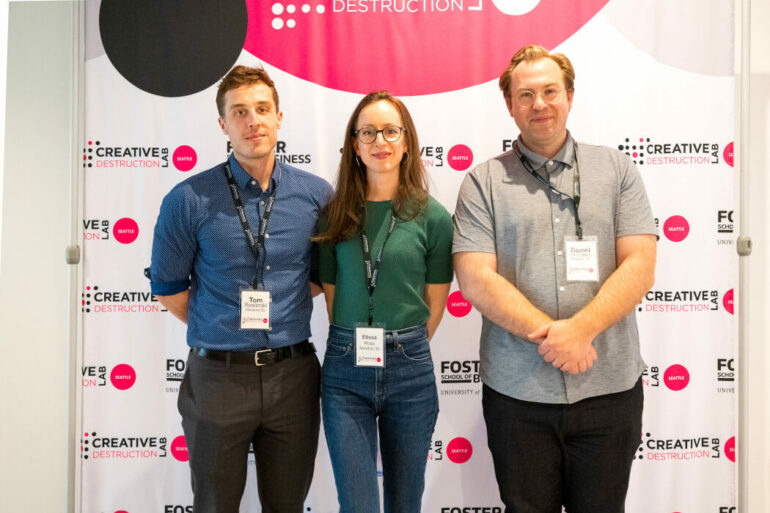Metafold 3D, which wants to make it easier for manufacturers to design and 3D print complex parts, has secured $2.35 million CAD ($1.78 million USD) in seed funding.
Toronto-based Metafold was founded in 2020 by a group of math, geometry, and architecture experts in CEO Elissa Ross, CTO Daniel Hambleton, and COO Tom Reslinski. Born out of Hambleton’s geometry-focused consulting agency, Mesh Consultants, Metafold sells design for additive-manufacturing software to sportswear and biopharmaceutical companies.
“We try to help our customers become both more sustainable and also more competitive.”
– Elissa Ross, Metafold
Metafold aims to help large-scale manufacturers become more environmentally and financially sustainable with its cloud and API-based 3D-engineering platform. It provides a geometric engine, lattice library, and direct-to-print capabilities to help teams develop, design, and produce complex 3D parts for a variety of additive manufacturing-related use cases.
The startup claims its software can help clients reduce the amount of material and preprocessing, iteration, and manufacturing time required to make certain products—saving them time and money while also reducing their environmental footprint.
“We try to help our customers become both more sustainable and also more competitive,” Ross told BetaKit in an interview. “People are not adopting additive [manufacturing] because it makes them feel good—they’re adopting additive because it makes financial sense. That’s the application that we are there to support.”
Metafold’s latest round, which closed in May, was led by New York-based Differential Ventures. The equity funding saw support from Toronto’s StandUp Ventures, United States-based Jetstream, and Vancouver’s Active Impact Investments, a climate tech-focused firm that financed Metafold’s $500,000 CAD pre-seed round about a year ago.
Ross, who declined to disclose Metafold’s latest valuation, described this investor syndicate as “a good reflection of Metafold as a business.” Differential targets data-driven, mathematics-oriented companies with deep technical underpinnings.
“We absolutely fit that bill, as we leverage advanced mathematics—in our case, geometry—to advance the additive manufacturing industry,” the mathematician-turned-entrepreneur said.
RELATED: Metafold 3D secures $500,000 from Active Impact Investments to build 3D printing’s “missing piece”
For his part, Differential Ventures founding partner David Magerman said in a statement that “Metafold’s technology will be game-changing for designing and visualizing complex structures in 3D printing, making currently impossible designs possible,” calling Ross and her co-founders the perfect team to bring this sort of tech to market.
Speaking to the economic conditions that Metafold closed its latest round—which took place shortly after the collapse of Silicon Valley Bank amid rising interest rates and a cooling venture capital market—Ross said, “It was bananas.”
“It was definitely not an easy time to fundraise, and it’s a difficult time when organizational budgets are constrained,” she added. Despite these tough conditions, Ross believes that among large organizations, the budgets still exist for innovation and additive manufacturing—which Metafold enables—as manufacturers look to remain competitive.
Ross noted that Metafold was also particularly happy to bring on a second climate-tech investor through its latest round in Jetstream. “We see a ton of potential for what Metafold is doing in the climate-tech space,” she added.
Manufacturing and transportation account for a significant proportion of carbon emissions, according to the United States Environmental Protection Agency. The environmental impact of 3D printing—a form of additive manufacturing—is often lower than that of traditional manufacturing, in part because the process allows manufacturers to 3D print parts and goods locally, rather than shipping them from around the world.
While people often think of 3D printing as being a clean technology, Ross claimed that the reality is more nuanced. On the one hand, additive manufacturing uses fewer materials and reduces costs and environmental impact. But in the grand scheme of things, Ross argued that this is much less of a factor compared to what 3D printing enables manufacturers to build.
“What makes a huge difference is the actual parts that get produced,” said Ross.
“It’s these new shapes that are giving these opportunities within cleantech.”
3D printing makes it possible to create components that have benefits over their entire lifetime of use, such as more lightweight and compact parts. A lighter part on a vehicle, for instance, could mean reduced fuel use and cost during the duration of a plane or car’s lifespan.
Another example Ross pointed to was process optimization in terms of heat exchange or carbon capture devices, which each rely on high surface area structures. According to the CEO, additive manufacturing is particularly good at packing surface area into small spaces.
“We create these very high surface area, high complexity geometric structures, and it’s these new shapes that are giving these opportunities within cleantech,” said Ross.
Metafold current customer base includes three “major” undisclosed sportswear manufacturers, and firms in the biopharma space using its tech to help create bioreactors and cell scaffolds for human stem cells and lab-grown meat.
Feature image courtesy Metafold 3D.


